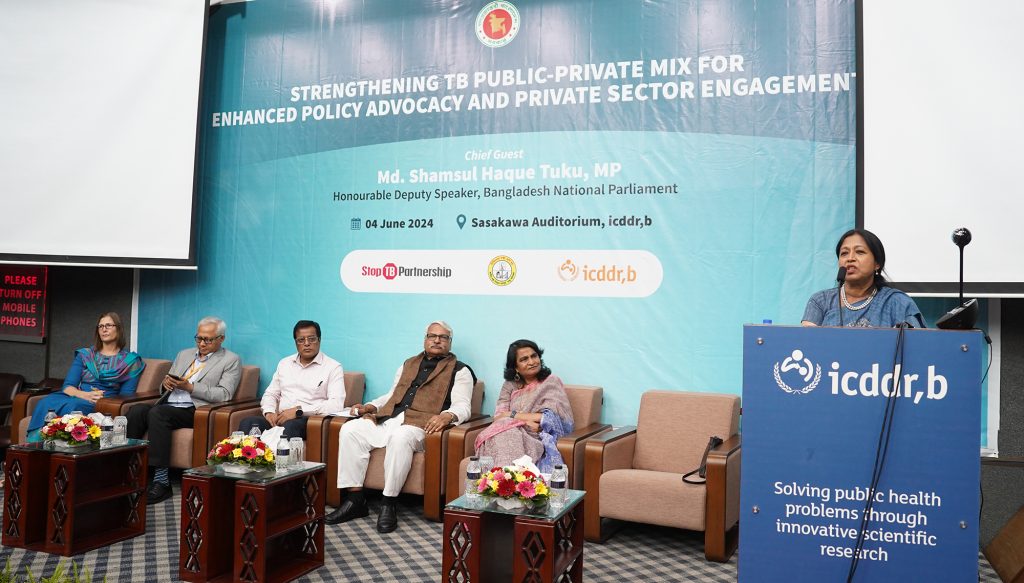Strengthening TB Public-Private Mix for Enhanced Policy Advocacy and Private Sector Engagement

Dhaka, Bangladesh, 04 June 2024: icddr,b, in collaboration with the National Tuberculosis Control Programme (NTP) and The Stop TB Partnership, hosted an event titled “Strengthening TB Public-Private Mix for Enhanced Policy Advocacy and Private Sector Engagement” at the Sasakawa Auditorium, icddr,b, Mohakhali, Dhaka. This initiative aimed to enhance policy advocacy and engage the private sector in Bangladesh’s national effort to combat tuberculosis (TB).

The Public-Private Mix (PPM) is essential in harnessing the strengths of both sectors to increase TB diagnosis and treatment coverage in Bangladesh. By involving private healthcare providers, more people can be reached with timely and effective TB care. PPM strategies ensure that high-quality TB services are available to everyone, regardless of where they seek care. Engaging the private sector also helps to leverage additional resources and innovations that can enhance TB control efforts. A well-coordinated PPM approach can improve case detection rates and ensure better treatment outcomes.
In his welcome remarks, icddr,b’s Executive Director, Dr Tahmeed Ahmed, highlighted icddr,b’s pivotal role in TB research in Bangladesh and its contributions to informing and shaping national policies and guidelines that have driven progress in TB control in the country. He said, “The extent of tuberculosis in Bangladesh cannot be addressed by the government alone. The private sector also needs to come forward and collaborate through public-private partnerships. One example is the network established by icddr,b, which includes public and private doctors and pharmacy owners. Through this network, patients suffering from a chronic cough are referred to TB centres run by icddr,b, where TB diagnosis is done rapidly using state-of-the-art GeneXpert technology.”
An audio-visual presentation titled “Journey to Cure: Private Sector Involvement in Battling Tuberculosis in Bangladesh” showcased the critical role of private sector engagement in combating TB, illustrating successful collaborations and their impacts on TB control efforts. A detailed presentation on “Addressing Public-Private Mix Policy Advocacy in Bangladesh” provided insights into the current policy landscape, challenges, and opportunities for enhancing the PPM approach in TB control.
In a plenary session, TB PPM stakeholders discussed the collective responsibility of public and private partners in combating TB, sharing best practices, and identifying actionable steps to strengthen PPM initiatives. Dr Md. Mahafuzer Rahman Sarker, Line Director, TB-L & ASP, emphasised the importance of sustained collaboration between public and private sectors to achieve national End TB goals.
Miranda Beckman, Deputy Office Director, OPHN, USAID Bangladesh, highlighted USAID’s commitment to supporting Bangladesh’s TB control efforts and the need for innovative approaches to engage the private sector.
Prof. Dr Meerjady Sabrina Flora, ADG (Planning and Development), DGHS, underscored the strategic importance of policy advocacy and the integration of private sector initiatives into national TB programmes.
Mr Md. Shamsul Hoque Tuku, MP, Deputy Speaker of the Bangladesh National Parliament, graced the event as the Chief Guest. In his remarks, he said, “The fight against diseases like tuberculosis requires social movements. In this social movement, the role of government, private institutions, and health organisations is very important. The ‘Parliamentary TB Caucus’ has already been formed by members of the Bangladesh National Parliament. This parliamentary platform is committed to bringing forward the relevant issues to fight TB at the highest levels of government. I believe that through the united cooperation of all, we will defeat TB.”
Dr Sayera Banu, Senior Scientist & Head of PEI, IDD, icddr,b, expressed her gratitude to all participants, stakeholders, and partners for their dedication and contributions towards the shared mission to end TB in Bangladesh.
The event highlighted the need for enhanced policy advocacy to engage the private sector in the country’s fight against TB. Collaborative efforts among the government, NGOs, and the private sector can lead to enhanced capacity and resource sharing, increased access to TB care, and better service delivery to the beneficiaries.












